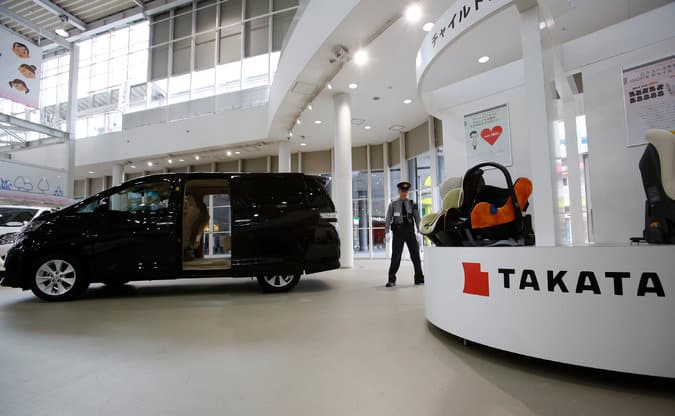In October 2014, a massive airbag recall of over 7.8 million vehicles was issued by the National Highway Traffic Safety Administration (NHTSA) over concerns that airbags from manufacturer Takata were faulty and dangerous. This recall covers numerous makes and models, affects vehicles worldwide, and continues to grow. Already this recall is substantially larger than the

In October 2014, a massive airbag recall of over 7.8 million vehicles was issued by the National Highway Traffic Safety Administration (NHTSA) over concerns that airbags from manufacturer Takata were faulty and dangerous. This recall covers numerous makes and models, affects vehicles worldwide, and continues to grow. Already this recall is substantially larger than the recent recall of GM vehicles; including vehicles worldwide, the recall currently affects 16.5 million automobiles.
The Problem
Airbags produced by manufacturer Takata contain a flaw that causes the airbag, when deployed, to inflate explosively, causing parts inside the airbag ignition system to break off. These parts, made of plastic and metal, effectively become shrapnel, puncturing the airbag’s fabric and seriously injuring the vehicle’s occupants. In affected Honda vehicles, rupturing airbags have contributed to two deaths and more than 30 injuries, with an additional 139 injuries reported from a varied collection of other manufacturers using the Takata airbags.
The Cause
There is particular urgency for vehicles located in high-humidity areas, such as the South, because the defect is associated with the airbag ignition source, which uses ammonium nitrate as a source for ignition and inflation of the airbag. Ammonium nitrate is sensitive to moisture, and it is suspected that the flaw in the affected airbags involves exposure of the compound to air-born moisture found in hot, humid areas. The NHTSA advises consumers living in hot, humid areas – Alabama, Florida, Georgia, Hawaii, Louisiana, Mississippi, Texas, and US territories American Samoa, Guam, Saipan, and the Virgin Islands – to have their vehicle inspected immediately. But regardless of where you live (and Southern Indiana can be hot and humid, too), assessing your vehicle’s risk for this recall should be done as soon as possible.
The Legal Impact
Happening so closely on the heels of the GM recall, the Takata airbag recall is alarming due to the incredible slowness of auto companies to respond to this defect.
The issue with Takata’s airbags dates back to 2004, when Honda first noticed the defect and filed the necessary paperwork with the NHTSA. The defect was reported again in 2007, and continued to be reported as recently as 2009 and 2010, in which airbags deployed and exploded in minor accidents, severely injuring or killing vehicle occupants. Despite the reports filed as required by law, further investigation into the issue was limited at best. Only after Honda issued a second recall for the same issue did other automobile manufacturers begin to question the safety of the airbag products in use in their own product lines.
According to a recent news article in the New York Times, when Takata became aware of the malfunction of its airbags in 2004, safety engineers at the company were ordered to conduct secret tests to determine the scope of the problem. The results of these tests led engineers to begin designing fixes for the issue in advance of a recall, but executives at Takata instead ordered testing data destroyed and maintained the existing airbag design. It was only after the growing body of evidence, several years in the making, pointed to a significant issue with the Takata airbag design that the NHTSA issued the airbag recall.
Affected Models
This recall affects more than 50 models manufactured between 2000 and 2011. The manufacturers include: BMW, Chrysler, Ford, General Motors, Honda, Mazda, Mitsubishi, Nissan, Subaru, and Toyota.
The NHTSA recommends you check your vehicle’s VIN number to determine if your vehicle is one affected by this recall. You can check your VIN number here.
If your vehicle is affected by the airbag recall
If you determine that your vehicle’s airbags are affected by this recall, contact your dealer’s service department and make arrangements for the necessary repairs.
If you’ve been injured
If you, a family member, or friend have been involved in an auto accident in which your airbags have deployed and ruptured due to this defect, causing injury or death, you may be entitled to compensation. Contact an experienced attorney for a review of the facts of your case.

